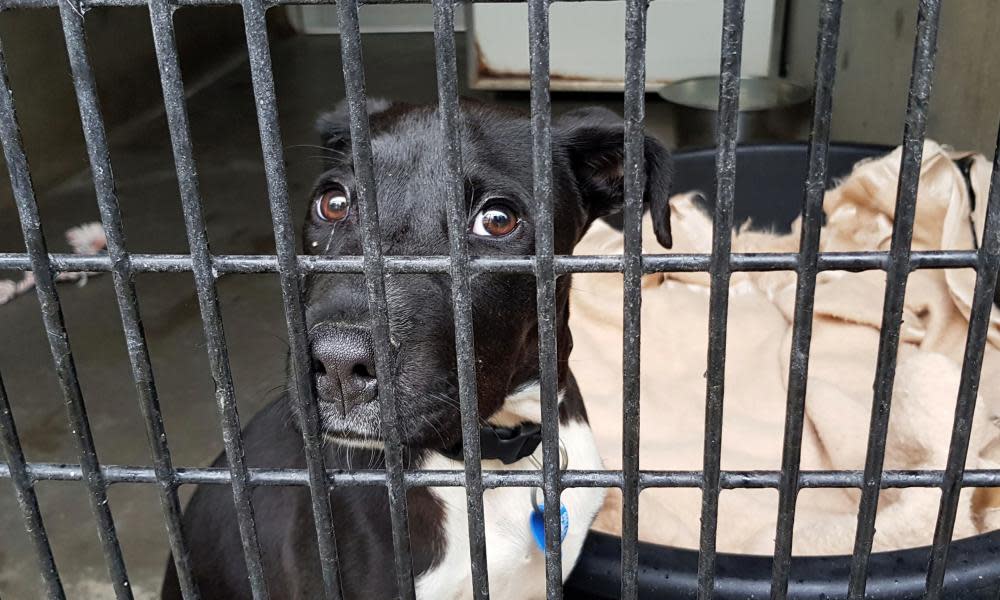‘Heartbreaking choice’: families forced to give up dogs and cats as Australia’s rental crisis bites

Families are being forced to give up hundreds of dogs, cats and other pets as Australia’s rental crisis bites.
In states where landlords are free to always refuse pets, “people are turning up with broken hearts,” the RSPCA South Australia spokeswoman, Carolyn Jones, said.
“They are saying to us that this is the hardest decision they’ve ever had to make.”
There is a hodge-podge of laws among the states and territories, and often it is up to individual landlords to decide whether pets are allowed. As the rental market tightens, people are being forced to sacrifice their pets to secure a place to live.
Related: Cold or mould: Sydney tenants told to keep windows open throughout winter
The situation appears to be the most dire in South Australia, where more than 600 pets had been surrendered this financial year to RSPCA SA’s main shelter.
So far in 2022, 616 animals had been surrendered – more than half were cats or kittens, about one in five were dogs or puppies, and the rest were other species.
That was about 22% of all surrenders, and compared to 432 last year and just 259 in 2019.
“It’s the default in SA not to allow pets … in an already tight rental market, the playing field’s just not level,” Jones said.
In the ACT, new rental laws enacted in 2019 mean tenancy agreements cannot ban pets completely. RSPCA ACT said there had not been an increase in animals abandoned because their owners need a rental property, but a spokesperson said it remained an issue, despite the change in the law.
In Victoria, where the laws changed in 2020 to stop landlords unreasonably restricting pets, the RSPCA had seen a slight decrease in surrenders.
In Western Australia, where RSPCA WA is pushing for the state government to follow the lead of the ACT and Victoria, up to 15% of the animals handed in were from owners unable to find a pet-friendly rental.
The rental crisis meant people had to “make the heartbreaking choice between surrendering their beloved pet or putting a roof over their family’s head”, the RSPCA WA’s chief executive officer, Ben Cave, said.
Renters have no recourse if a landlord denies them a lease, and RSPCA WA wants changes so landlords have to provide “a good reason to refuse a renter’s request to keep a pet”.
“This is a much more sensible approach where the landlord and tenant can have a mature conversation about whether it is reasonable for the proposed pet to live in a particular dwelling,” Cave said.
In New South Wales, where blanket bans on animals in buildings under strata leases ended last year, animals surrendered because people are moving (including not being able to take pets to a new rental) had stayed relatively steady.
Queensland recently introduced laws to get rid of automatic pet refusals, the NT already has similar laws, and while some in Tasmania are pushing for changes, tenants currently need permission from landlords to have pets.
Guardian Australia asked the Australian Landlords Association for comment.
Email: sign up for our daily morning briefing newsletter
App: download the free app and never miss the biggest stories, or get our weekend edition for a curated selection of the week's best stories
Social: follow us on YouTube, Facebook, Instagram, Twitter or TikTok
Podcast: listen to our daily episodes on Apple Podcasts, Spotify or search "Full Story" in your favourite app
Jones said the majority of pet owners make really good tenants, and owning pets makes people happier.
She said people who end up at the SA shelter have been searching for weeks or months for accommodation. “This is their last resort,” she said.
“There is a lot of distress at our surrenders desk. And it’s distressing for the animals because they have loving homes then all of a sudden they go into a shelter environment and they don’t understand what’s happened.”
Jones said RSPCA SA wanted people to be able to approach and negotiate with landlords, any restrictions on pets, waste management, or the introduction of a pet rental bond.
“Whatever it takes to get it over the line,” she said.

 Yahoo News
Yahoo News 
